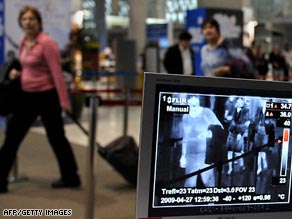
Quarantine officers monitor arrivals with a thermographic device at Bangkok's main international airport.
Just what is the World Health Organization, based in Geneva, Switzerland? How does it differ from the Centers for Disease Control and Prevention, based in Atlanta, Georgia?
What is the difference between an infectious disease and a contagious disease? Or between being held in quarantine and being held in isolation?
CNN attempts to make sense of the terminology.
• A contagious disease is a condition that is spread through direct contact between people, for example through two individuals touching each other.
• An infectious disease is a condition which can be transmitted through micro-organisms such as viruses or bacteria. The spread of the disease does not have to involve person-to-person direct contact; it can be spread through the air or through common surfaces such as door handles, keyboards etc.
• Quarantine is used to restrict the movement of an individual or individuals who is/are believed to be at risk of carrying a disease -- even if they are as yet to show symptoms. The quarantined subject will be monitored in a controlled environment for a set period of time before being released if he or she displays no signs of the disease.
• Isolation is more restrictive than quarantine. It is deployed to keep an individual suspected of carrying a disease from coming into contact with others, often including healthcare officials. In the most extreme cases the individual will be housed in a protective bubble to prevent contaminated air from reaching others.
• An epidemic is an outbreak of a disease that affects more individuals than usual or else behaves in a more aggressive manner than is usually expected.
• A pandemic, according to the World Health Organization (see below), is when an epidemic takes on global proportions. WHO states that it tends to happen when a new virus emerges, adding that "because the virus is new, the human immune system will have little or no pre-existing immunity. People who contract pandemic influenza are thus likely to experience more serious disease than that caused by normal influenza."
• The H1N1 virus is one of several types of influenza. Variants of the virus were responsible for some of the severest influenza outbreaks of recent times, including the 1918-1919 pandemic, which killed at least 50 million people worldwide. The current swine flu outbreak is believed to be another variant on H1N1, although there is no belief at this stage that it will be as severe as earlier outbreaks nor spread to the same extent.
• According to the WHO, a public health emergency is an occurence or imminent threat of illness or health conditions caused by bioterrorism, epidemic or pandemic disease, or highly fatal infectious agents or toxins that pose serious risk to a significant number of people.
• Founded in 1948, the WHO (World Health Organization) is the global health arm of the United Nations. It determines its role as "providing leadership on global health matters, shaping the health research agenda, setting norms and standards, articulating evidence-based policy options, providing technical support to countries and monitoring and assessing health trends."
In a situation such as the current swine flu outbreak, it will play a crucial role in leading and co-ordinating the worldwide health response. It is based in Geneva, Switzerland.
































0 comments:
Post a Comment